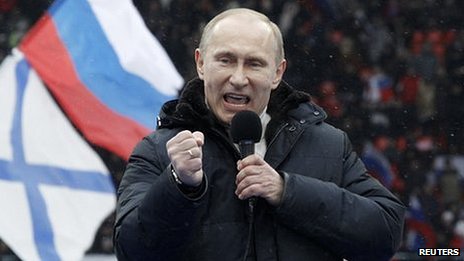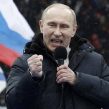
Russia’s History Is Too Tragic and Its Society Too Complex to Fit into Putin’s Worldview
Publication: Eurasia Daily Monitor Volume: 10 Issue: 52
By:

A stunning historical discovery was made at the first meeting of the revived Russian Military History Society when President Vladimir Putin asserted that the Bolsheviks used Finnish “armed formations” for executing the coup in October 1917 (Rossiskaya Gazeta, March 14). Even more remarkable was his reinterpretation of the Winter War with Finland (1939–1940) as not an act of aggression aimed at subjugating a neighbor that rejected the Communist model, but merely an attempt to correct earlier mistakes of drawing the border too close to St. Petersburg (Vedomosti, March 14). Putin conceded that the first months of that war were “bloody and inefficient” but concluded on a positive note that necessary forces were eventually mobilized and “everything fell into their right places” so that “the other side felt the entire might of the Russian—then Soviet—state” (RIA Novosti, March 14). This glorification of Stalin’s militaristic expansionism adds only a tiny fresh dose of poison to Russian-Finnish relations, but it speaks volumes about Putin’s perception of the modern world and Russia’s place in it.
The authorities are currently waging a massive campaign of “patriotic” reinvention of Russian history, religion and even literature. Minister of Culture Vladimir Medinsky (who happens also to be the chairman of the military-historical society) captured the essence of it nicely by declaring that Russia’s history was made up of “incessant military confrontation[s], defense and military victories” (Moscow Echo, March 15). Hundreds of enthusiastic bureaucrats and activists are busy rewriting school textbooks so that history courses can be “free of contradictions” and so that the excessively rich Russian literature can be censored of works that could give the young generation wrong ideas (Grani.ru, March 15). In synch with this brain-washing, the newly-appointed Defense Minister Sergei Shoigu has offered up the idea of organizing at the most prestigious universities scientific platoons and battalions that would work on projects for the armed forces (Novaya Gazeta, March 13). Meanwhile, the State Duma, which is being discredited by one corruption scandal after another, generates a deluge of “patriotic” legislation, while condemning its critics and ostracizing deputies who dare to question the mass hysteria, particularly when speaking in the United States (Moskovsky Komsomolets, March 16).
In this picture of mobilizing the elites to march under the chauvinist drum, one important cadre decision stands out: Putin has nominated Elvira Nabiullina, a respected economist with impeccable liberal credentials, to the position of the chairperson of the Central Bank (Kommersant, March 13). This deviation from the populist course shows that Putin understands that key financial levers cannot be entrusted to loyal siloviki and that leftist-statist recipes would quickly deliver Russia to an economic disaster (Polit.ru, March 13). The Russian president is obviously disappointed in the performance of the gas industry, which used to corroborate his vision of the country’s self-perpetuating strength and unique mission, and cannot remain in denial of the trend of diminishing petro-rents. He may find it useful to keep every high- or mid-level official under threat of criminal investigation but is powerless to check the escalation of corruption in the predatory bureaucratic machine (Gazeta.ru, 12 March).
Economists are by no means the only group that challenges the rationale of the dirigiste course or the dominance of state-centric discourse. Putin relies on constant reaffirmation of his leadership through pervasive presence on TV screens (his unscripted remarks on the war with Finland were carefully edited out). However, 43 percent of adult Russians now use the uncensored Internet on a daily basis—which is 13 percent higher than a year ago (Lenta.ru, March 16). A big splash in the Russian blogosphere was made last week by émigré writer Mikhail Shishkin, who refused to be a member of the delegation to the New York book fair, Book Expo, citing his shame of representing a country ruled by a criminal regime (Besttoday, March 12). Moscow’s theaters, meanwhile, compete to find contemporary anti-totalitarian twists in the plays of Oscar Wilde and Bertolt Brecht and gather full houses for the sharpest political satire (Kommersant-Weekend, March 15). Moreover, a new talk-show or “newsical” Gospodin Horoshy (Perfect Gentleman), which airs on the Internet-TV channel Dozhd (tvrain.ru), makes such outrageous fun of the official version of the political order that no volume of state-controlled TV propaganda could erase this message (Colta.ru, March 13).
Putin is not aware of the full scope of this vibrant cultural rebellion but probably suspects that no amount of bureaucratic control and “patriotic” instruction can check it. So he seeks to harness the tradition of militarism, which cuts across the corrosive influence of liberal arts. It is indeed possible to exploit the deep-rooted feelings of insecurity in Russian society, confirmed by a recent poll, in which 51 percent of respondents see a direct military threat to Russia from other states and 57 percent are confident that the army can protect Russia against such a threat (Levada.ru, February 22). Erecting monuments to the “heroes” of the Russian-Finnish war is as much a part of this revival of militarist culture as the considerably trumpeted decision to restore a permanent Russian naval presence in the Mediterranean (Nezavisimoe Voennoe Obozrenie, March 15). The desire to show the flag overrules the pedestrian reasoning that, in order to deploy 5–6 combat ships in the theater where Russia has no friendly bases, all Russian fleets would have to stretch their resources to the limit (Newsru.com, March 17). Militarism is an expensive proposition, while returns on the massive investments in rearmament, even according to Deputy Prime Minister Dmitry Rogozin, are far from impressive (RIA Novosti, March 15).
Putin’s idea of a “strong” Russia that should mobilize itself under his leadership in order to meet the challenges of the immanently hostile world has some currency among most of the electorate, which is fearful of fast and confusing change and seeks reassurance in the past. These instinctive conservatives cannot fail to see, however, that it is the regime itself—which claims ownership of “heroic” traditions—that saps Russia’s strength through shameless corruption and denies it a chance to gain new respect. Every authoritarian regime cherishes the illusion that by rewriting history it can gain a longer lease on life. But the Kremlin has managed to botch its historic excursions so thoroughly that one has to wonder what sort of horizon Putinism might possibly have.




